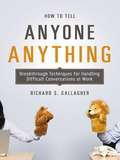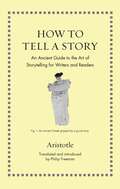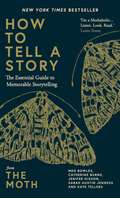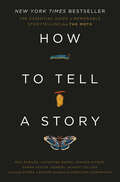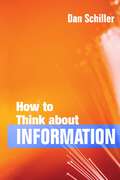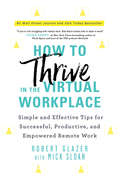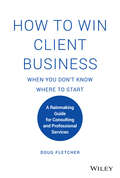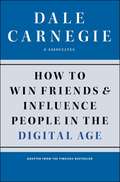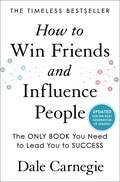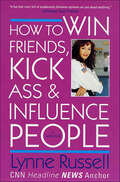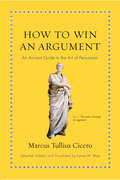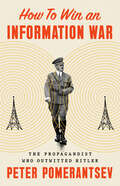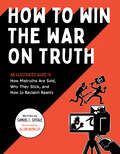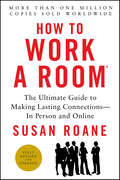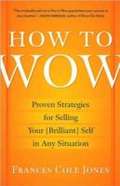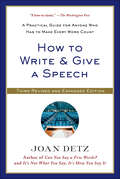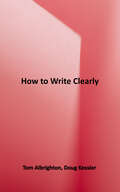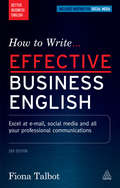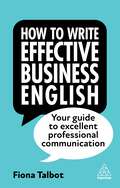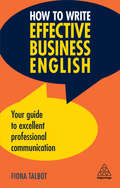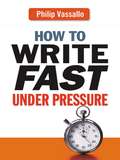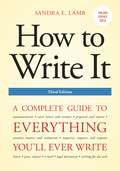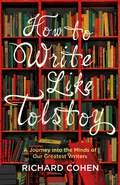- Table View
- List View
How to Tell Anyone Anything: Breakthrough Techniques for Handling Difficult Conversations at Work
by Richard GallagherNo one likes to be criticized. But when feedback is necessary—whether it’s with a boss, someone we manage, or another co-worker—it takes great communication skills to successfully get the message across with feelings and relationships intact.Drawing from the latest in psychology on how best to connect with others, How to Tell Anyone Anything steers readers away from the common mistake of focusing on what’s wrong, and shows them instead how to provide clear, constructive, positive messages that create real behavior and performance change. Complete with illuminating examples and a unique step-by-step process, the book gives readers powerful insight into how we all react naturally to criticism—and how to transform interactions that might become verbal tugs-of-war into collaborative, problem-solving sessions.
How to Tell a Story: An Ancient Guide to the Art of Storytelling for Writers and Readers (Ancient Wisdom for Modern Readers)
by AristotleAn inviting and highly readable new translation of Aristotle’s complete Poetics—the first and best introduction to the art of writing and understanding storiesAristotle’s Poetics is the most important book ever written for writers and readers of stories—whether novels, short fiction, plays, screenplays, or nonfiction. Aristotle was the first to identify the keys to plot, character, audience perception, tragic pleasure, and dozens of other critical points of good storytelling. Despite being written more than 2,000 years ago, the Poetics remains essential reading for anyone who wants to learn how to write a captivating story—or understand how such stories work and achieve their psychological effects. Yet for all its influence, the Poetics is too little read because it comes down to us in a form that is often difficult to follow, and even the best translations are geared more to specialists than to general readers who simply want to grasp Aristotle’s profound and practical insights. In How to Tell a Story, Philip Freeman presents the most readable translation of the Poetics yet produced, making this indispensable handbook more accessible, engaging, and useful than ever before.In addition to its inviting and reliable translation, a commentary on each section, and the original Greek on facing pages, this edition of the Poetics features unique bullet points, chapter headings, and section numbers to help guide readers through Aristotle’s unmatched introduction to the art of writing and reading stories.
How to Tell a Story: The Essential Guide to Memorable Storytelling from The Moth
by Catherine Burns Meg Bowles Jenifer Hixson Sarah Austin Jenness Kate Tellers The MothNEW YORK TIMES BESTSELLER - The definitive guide to telling an unforgettable story in any setting, drawing on twenty-five years of experience from the storytelling experts at The MothYou are a multitude of stories. Every joy and heartbreak, every disappointment and dizzying high, has the makings of an unforgettable story. Whether your goal is to deliver the perfect wedding toast, give a moving eulogy, ace a job interview or simply connect more deeply to those around you, The Moth is here to help. A leader in the modern storytelling movement, The Moth inspires thousands of people around the globe to share their stories each year.In this book, the Moth team reveal the secrets of their time-honed process and use examples from beloved storytellers like Neil Gaiman, Elizabeth Gilbert, Nikesh Shukla, Sarfraz Manzoor and more, to show you how to:* mine your memories for your best stories* explore structures that will boost the impact of your story* deliver your stories with confidence* tailor your stories for any occasionFilled with empowering, easy-to-follow tips, this book will help you to unleash the power of storytelling on your life.
How to Tell a Story: The Essential Guide to Memorable Storytelling from The Moth
by Catherine Burns The Moth Meg Bowles Jenifer Hixson Sarah Austin Jenness Kate TellersNEW YORK TIMES BESTSELLER • The definitive guide to telling an unforgettable story in any setting, drawing on twenty-five years of experience from the storytelling experts at The Moth &“From toasts to eulogies, from job interviews to social events, this book will help you with ideas, structure, delivery and more.&”—CNNLONGLISTED FOR THE PORCHLIGHT BUSINESS BOOK AWARDOver the past twenty-five years, the directors of The Moth have worked with people from all walks of life—including astronauts, hairdressers, rock stars, a retired pickpocket, high school students, and Nobel Prize winners—to develop true personal stories that have moved and delighted live audiences and listeners of The Moth&’s Peabody Award–winning radio hour and podcast. A leader in the modern storytelling movement, The Moth inspires thousands of people around the globe to share their stories each year. Now, with How to Tell a Story, The Moth will help you learn how to uncover and craft your own unique stories, like Moth storytellers Mike Birbiglia, Rosanne Cash, Neil Gaiman, Elizabeth Gilbert, Padma Lakshmi, Darryl &“DMC&” McDaniels, Tig Notaro, Boots Riley, Betty Reid Soskin, John Turturro, and more. Whether your goal is to make it to the Moth stage, deliver the perfect wedding toast, wow clients at a business dinner, give a moving eulogy, ace a job interview, be a hit at parties, change the world, or simply connect more deeply to those around you, stories are essential. Sharing secrets of The Moth&’s time-honed process and using examples from beloved storytellers, a team of Moth directors will show you how to • mine your memories for your best stories• explore structures that will boost the impact of your story• deliver your stories with confidence• tailor your stories for any occasion Filled with empowering, easy-to-follow tips for crafting stories that forge lasting bonds with friends, family, and colleagues alike, this book will help you connect authentically with the world around you and unleash the power of story in your life.
How to Think about Information
by Dan SchillerIt is common wisdom that the U.S. economy has adapted to losses in its manufacturing base because of the booming information sector, with high-paying jobs for everything from wireless networks to video games. We are told we live in the Information Age, in which communications networks and media and information services drive the larger economy. While the Information Age may have looked sunny in the beginning, as it has developed it looks increasingly ominous: its economy and benefits grow more and more centralized--and in the United States, it has become less and less subject to democratic oversight. Corporations around the world have identified the value of information and are now seeking to control its production, transmission, and consumption. In How to Think about Information, Dan Schiller explores the ways information has been increasingly commodified as a result and how it both resembles and differs from other commodities. Through a linked series of theoretical, historical, and contemporary studies, Schiller reveals this commodification as both dynamic and expansionary, but also deeply conflicted and uncertain. He examines the transformative political and economic changes occurring throughout the informational realm and analyzes key dimensions of the process, including the buildup of new technological platforms, the growth of a transnationalizing culture industry, and the role played by China as it reinserts itself into an informationalized capitalism.
How to Thrive in the Virtual Workplace: Simple and Effective Tips for Successful, Productive, and Empowered Remote Work
by Robert GlazerThe remote work revolution has been rapidly accelerated by the COVID-19 pandemic. Organizations as big as Twitter have learned their employees didn't need an office to get great results, and employees are using the flexibility of remote work to live where they want, ditch their commutes and live a work-life integration that works for them.Remote work is here to stay, and the companies that do it well will have a clear competitive advantage in the future. As founder and CEO of Acceleration Partners, a 100 percent remote organization with 170 employees who work from home, Robert Glazer has discovered that with the right principles, tactics and tools for managing remote employees, many businesses can excel in a virtual world. In this highly actionable book, Glazer shares how he and his team built a remote organization that has been recognized with dozens of awards for its industry performance and company culture.How to Thrive in the Virtual Workplace shares insights from the remote employee, manager and leader perspectives, offering a blueprint any person can use to make remote work successful, productive and fulfilling. Learn how to leverage the flexibility of remote work, be more productive while working at home, avoid burnout, lead a team of virtual employees and build an organization that sets the gold standard for virtual work.The remote work revolution is here—the leaders who will build the future are the ones who can lead top performing virtual teams. Learn how to build a world-class organization—office no longer required.
How to Win Any Argument
by Robert MayerThis guide to negotiating is “mental judo, where you use the other guy’s energy to win. It’s mind-set. It’s charisma” (New York Times).The art of the argument. It’s mysterious and powerful. It’s the art of having things go your way. But it’s also the art of getting out of your own way. It’s having the Moves. But it’s also about having the Touch. Welcome to the “new normal.” It’s a time and place where conversations are tougher, disagreements more frequent, consensus more difficult to find than ever before. This new world demands three new “right for our times” chapters:“Heavy Metal Moves” and “Taboo Tactics”: When you’re being dissed, dismissed, and dumped on. Or when you need to break through.“Waging Peace: The Mediation, Arbitration, and Collaborative Practice Game”: Because there’s more conflict but less money to hire litigation lawyers.“The World Has Gotten Smaller”: Learn to identify deep-rooted cultural differences, and how to act and react.“This will be one of the most important books you’ve read in a long time.” —Larry King“Two thumbs up! A whole new way of being smart about all the people in your life—coworkers, bosses, family, the people you do business with. Bob Mayer tells you how to finesse the results you want without pleading, prodding, pushing, or pulling.” —Cuba Gooding, Jr., Academy Award–winning actor
How to Win Client Business When You Don't Know Where to Start: A Rainmaking Guide for Consulting and Professional Services
by Doug FletcherDramatically grow your client base following pragmatic and insightful advice by bestselling author Doug Fletcher How to Win Client Business When You Don't Know Where to Start: A Rainmaking Guide for Consulting and Professional Services serves as an invaluable and indispensable guide for everyone in the business of selling professional and consulting services. Author Doug Fletcher dives deeply into the five skills required to "make it rain": Create Your Personal Brand Identity Demonstrate Your Professional Expertise Build Your Professional Ecosystem Develop Trust-Based Relationships Practice Everyday Success Habits How to Win Client Business When You Don't Know Where to Start provides a masterclass in teaching the practical techniques and concrete strategies that professional services providers were never taught in school or on the job. Pragmatic lessons take the place of the vaguely defined principles found in competing books to turn readers from sales novices into rainmakers. Written by the same celebrated author who brought readers the best-selling book How Clients Buy, How to Win Client Business When You Don't Know Where to Start is perfect for any professional services provider or consultant who seeks to dramatically increase their book of business.
How to Win Friends and Influence People in the Digital Age (Dale Carnegie Books)
by Dale Carnegie AssociatesAN UP-TO-THE -MINUTE ADAPTATI ON OF DALE CARNEGIE 'S TI MELE SS PRESCRIPTI ONS FOR THE DIGITAL AGE DALE CARNEGIE's commonsense approach to communicating has endured for a century, touching millions and millions of readers. The only diploma that hangs in Warren Buffett's office is his certificate from Dale Carnegie Training. Lee Iacocca credits Carnegie for giving him the courage to speak in public. Dilbert creator Scott Adams called Carnegie's teachings "life-changing." In today's world, where more and more of our communication takes place across wires and screens, Carnegie's lessons have not only lasted but become all the more critical. Though he never could have predicted technology's trajectory, Carnegie proves a wise and helpful teacher in this digital landscape. To demonstrate the many ways his lessons remain relevant, Dale Carnegie & Associates, Inc., has reimagined his prescriptions and his advice for this difficult digital age. We may communicate today with different tools and with greater speed, but Carnegie's advice on how to communicate, lead, and work efficiently remains priceless across the ages.
How to Win Friends and Influence People: Updated For the Next Generation of Leaders (Deluxe Hardbound Edition Ser.)
by Dale CarnegieUpdated for the first time in more than forty years, Dale Carnegie&’s timeless bestseller How to Win Friends and Influence People—a classic that has improved and transformed the personal and professional lives of millions.This new edition of the most influential self-help book of the last century has been updated under the care of Dale&’s daughter, Donna, introducing changes that keep the book fresh for today&’s readers, with priceless material restored from the original 1936 text. One of the best-known motivational guides in history, Dale Carnegie&’s groundbreaking publication has sold tens of millions of copies, been translated into almost every known written language, and has helped countless people succeed. Carnegie&’s rock-solid, experience-tested advice has remained relevant for generations because he addresses timeless questions about the art of getting along with people. How to Win Friends and Influence People teaches you: -How to communicate effectively -How to make people like you -How to increase your ability to get things done -How to get others to see your side -How to become a more effective leader -How to successfully navigate almost any social situation -And so much more! How to Win Friends and Influence People is a historic bestseller for one simple reason: Its crucial life lessons, conveyed through engaging storytelling, have shown readers how to become who they wish to be. With the newly updated version of this classic, that&’s as true now as ever.
How to Win Friends, Kick Ass & Influence People: A Memoir
by Lynne RussellAfter fifteen years of international exposure as an anchor for CNN's Headline News, Lynne Russell has become one of the most recognized and beloved women working in broadcast journalism. Renowned for her on-air combination of professionalism and irrepressible energy, Russell is every bit as remarkable off camera as she is on. Not only does she know her way around a newsroom, but as a private investigator, bodyguard, and black belt, she is a force to be reckoned with.Russell writes, for the first time, about her amazing life, from her memories of childhood as a self-described nomad following her army father around the globe, to a frank look at her ill-advised early marriage, to her steady rise through the ranks of radio and television. Then she turns her attention to what her remarkable achievements have taught her about work, love, body language, and the best little shoe store on the Champs Elysée, and gives us her gutsy advice for life today.
How to Win an Argument: An Ancient Guide to the Art of Persuasion
by Marcus Tullius Cicero James M. MayAll of us are faced countless times with the challenge of persuading others, whether we're trying to win a trivial argument with a friend or convince our coworkers about an important decision. Instead of relying on untrained instinct--and often floundering or failing as a result--we'd win more arguments if we learned the timeless art of verbal persuasion, rhetoric. How to Win an Argument gathers the rhetorical wisdom of Cicero, ancient Rome's greatest orator, from across his works and combines it with passages from his legal and political speeches to show his powerful techniques in action. The result is an enlightening and entertaining practical introduction to the secrets of persuasive speaking and writing--including strategies that are just as effective in today's offices, schools, courts, and political debates as they were in the Roman forum.How to Win an Argument addresses proof based on rational argumentation, character, and emotion; the parts of a speech; the plain, middle, and grand styles; how to persuade no matter what audience or circumstances you face; and more. Cicero's words are presented in lively translations, with illuminating introductions; the book also features a brief biography of Cicero, a glossary, suggestions for further reading, and an appendix of the original Latin texts.Astonishingly relevant, this unique anthology of Cicero's rhetorical and oratorical wisdom will be enjoyed by anyone who ever needs to win arguments and influence people--in other words, all of us.
How to Win an Information War: The Propagandist Who Outwitted Hitler
by Peter PomerantsevFrom one of our leading experts on disinformation, this inventive biography of the rogue WWII propagandist Sefton Delmer confronts hard questions about the nature of information war: what if you can't fight lies with truth? Can a propaganda war ever be won? In the summer of 1941, Hitler ruled Europe from the Atlantic to the Black Sea. Britain was struggling to combat his powerful propaganda machine, crowing victory and smearing his enemies as liars and manipulators over his frequent radio speeches, blasted out on loudspeakers and into homes. British claims that Hitler was dangerous had little impact against this wave of disinformation. Except for the broadcasts of someone called Der Chef, a German who questioned Nazi doctrine. He had access to high-ranking German military secrets and spoke of internal rebellion. His listeners included German soldiers and citizens, as well as politicians in Washington DC who were debating getting into the war. And--most importantly--Der Chef was a fiction. He was a character created by the British propagandist Thomas Sefton Delmer, a unique weapon in the war. Then, as author Peter Pomerantsev seeks to tell Delmer's story, he is called into a wartime propaganda effort of his own: the US response to the invasion of Ukraine. In flashes forward to the present day, Pomerantsev weaves in what he's learning from Delmer as he seeks to fight against Vladimir Putin's tyranny and lies. This book is the story of Delmer and his modern investigator, as they each embark on their own quest to manipulate the passions of supporters and enemies, and to turn the tide of an information war, an extraordinary history that is informing the present before our eyes.
How to Win the War on Truth: An Illustrated Guide to How Mistruths Are Sold, Why They Stick, and How to Reclaim Reality
by Samuel C. SpitaleMade to Stick by Chip Heath meets Thing Explainer by Randall Munroe in this illustrated guide to navigating today&’s post-truth landscape, filled with real-world examples of disinformation campaigns.The average person receives 4,000 to 10,000 media messages a day. It&’s no wonder we struggle to separate the news from the noise and fact from fiction--but in these unprecedented times, it&’s essential to democracy that we do. For anyone struggling to figure out how to live--and vote--their values, How to Win the War on Truth is here to help. You&’ll learn: • The history of propaganda, from Edward Bernays to Fox News • Why simple messages are so powerful • How social messaging creates unconscious biases • Who profits from propaganda • How propaganda is manufactured and delivered directly to you Filled with real-world examples of disinformation campaigns that impact every citizen and clever illustration, How to Win the War on Truth will help you see the world with clear eyes for the first time.
How to Work a Room: The Ultimate Guide to Making Lasting Connections—In Person and Online
by Susan RoAneFully revised and updated: the ground-breaking, classic guide to socializing and communication in any situation to succeed in business and life.For anyone who wants to make a stronger impressions, get more use out of professional connections, or turn new acquaintances into valued, long-lasting relationships, Susan RoAne’s How to Work a Room is essential reading. And this Silver Anniversary edition is fully updated to address social interaction in the digital age. Drawing from her vast experiences working with top industry leaders such as Coca-Cola, Apple, the NFL, and UnitedHealth, Susan RoAne presents easy-to-implement strategies to exude more confidence, win over your colleagues, and achieve more. Simple and effective, you’ll learn how to:approach someone you don’t know, in person or onlineremember names (and what to do if you don't)start, maintain, and end conversations . . . graciouslyuse humor, and when not to do sofollow simple but often unspoken rules of etiquetteuse social media for networkingand much more!
How to Wow: Proven Strategies for Selling Your [Brilliant] Self in Any Situation
by Frances Cole Jones"The invaluable advice in How to Wow guarantees your success in any meeting situation, from the boardroom to the breakfast table."--Keith Ferrazzi, author of Never Eat Alone. In today's fast-paced world, where an elevator ride with your CEO can turn into an impromptu meeting, your lunch date can become a job interview, and your conversation at a cocktail party may be a preamble to a potential business merger, knowing how to market yourself in any situation is vital. Corporate coach Frances Cole Jones has helped numerous CEOs, celebrities, and public personalities present their best selves on camera and onstage, in boardrooms and in person; now in her new book, How to Wow, she shares her strategies for making your mark in business and in life. Every encounter, Jones believes, provides you with an opportunity to positively influence colleagues, employers, neighbors-even competitors. Not only your words, but your tone of voice and your body language speak volumes. The question, however, is: Are they working together to say what you want them to, as effectively as possible? Inside, you'll learn how to *leave a lasting impression with a simple introduction *effectively employ the twelve most persuasive words in the English language and command the stage, boardroom, or lunch table *read nonverbal responses accurately-and shift negative ones immediately *motivate your team under deadline *interview fearlessly and flawlessly *write the perfect pitch, résumé, cover letter, or e-mail *deliver speeches that bring people to their feet *transform a PowerPoint presentation into a powerful success With easy-to-follow advice, amusing anecdotes, and immediately employable hints, Jones's guidelines can keep you cool (even in hot water). From asking the right questions to giving the right answers, How to Wow will provide you with the confidence to be calm and commanding in all you do and to wow anyone anywhere anytime.
How to Write & Give a Speech: A Practical Guide for Anyone Who Has to Make Every Word Count
by Joan Detz“A practical text for helping anyone develop the ability to speak and become more effective.” —Terrence J. McCann, Toastmasters International“A how-to classic.” —The Washington PostWith more than 65,000 copies sold in two editions and recommended by Forbes and U.S. News & World Report,this newly updated and expanded guide offers sound advice on every aspect of researching, writing, and delivering an effective speech. Filled with meaningful anecdotes, compelling examples, and practical advice, this accessible guide will help you speak with confidence and authority.Speechwriter and coach Joan Detz covers everything from the basics to the finer points of speaking with passion, persuasion, and style. Topics include:Assessing your audienceResearching your subject—and deciding what to leave outKeeping it simpleUsing imagery, quotations, repetition, and humorSpecial-occasion speechesSpeaking to international audiencesUsing Power Point and other visual aidsAnd many moreUpdated to include new examples and the latest technology, as well as a section on social media, this is a time-saving, success-boosting must-have for anyone who writes and delivers speeches, whether they are novices or experienced veterans at the podium.
How to Write Clearly: Write with purpose, reach your reader and make your meaning crystal clear
by Tom AlbrightonWhatever you're writing, you have to make it clear. You could be writing a website, a brochure, or a client presentation. You could be preparing a job application, an email, or a classified ad. Or you might be writing an article or a book. Whatever it is, the clearer you make it, the better your results will be. How to Write Clearly will help. It's an authoritative yet easy-to-read guide that will make your non-fiction writing more colourful, expressive, and precise. Writing is more than just words on a page. It's a process of communication. That's why How to Write Clearly draws on cutting-edge ideas from psychology, education, and linguistics to look deep into the reader's mind and explore the 'why' as well as the 'how' of writing techniques. It's ideal for marketers, businesspeople, journalists, educators, and anyone who needs to communicate with the written word. You'll learn: - How to understand your reader and tune into what they need - How to use plain language to make your writing accessible, readable and relatable - Ten treacherous traps you must avoid - Proven techniques for explaining new ideas - How to captivate your reader with storytelling, humour, intrigue, perspective and more - What changes readers' minds - How to craft clear sentences and paragraphs - Using empathy and pacing to put the reader at their ease - How to choose the right structure, length and title - Pages of pro tips for drafting, editing and using feedback. Fully illustrated and referenced, with a wealth of examples throughout, this book is the definitive guide to non-fiction writing today.
How to Write Effective Business English
by Fiona TalbotHow to Write Effective Business English gives guidance to both native and non-native English speakers on how to express yourself clearly and concisely. With case studies and real-life examples that demonstrate how English is used internationally in business, and full of ideas to help you get your communications right first time, How to Write Effective Business English sets the scene for describing the benefits of good Business English, ideal for multinational companies where communication is a priority. For native English speakers, it may mean un-learning things you were taught at school and learning how to save time by getting to the point more quickly in emails; for elementary to immediate English speakers, it focuses on the areas that are easy to get wrong. How to Write Effective Business English draws on the author's wealth of experience, using real-life international business scenarios to develop your skills and provide you with some answers that even your boss might not know. You will learn a system to help you quickly and easily write emails, letters, CVs and more. Featuring sections on punctuation and grammar, checklists to help you assess how you are getting on before moving on to the next stage and now with a new chapter on how to write effectively for social media, How to Write Effective Business English has been praised by both native and non-native writers of English as an indispensable resource.
How to Write Effective Business English: Your Guide to Excellent Professional Communication
by Fiona TalbotUnlearn bad habits, sharpen your emails and improve your written communication throughout your business with How to Write Effective Business English. An easy-to-follow guide on how to write with confidence, whether or not English is your first language.With new chapters on writing well across all disciplines, writing globally, and the impact of social media on workplace communication, this new edition prepares you to clearly liaise with your colleagues and to your target market in order to get your point across.Not only is this for individuals who want to better their craft and build their confidence, but it's also for multinational companies where communication is vital. Whether you're fluent in English or still learning, all speakers can iron out areas where there are common misconceptions, and bring those skills into their workplace.Fiona Talbot informs you on how to format your prose to cater for a business world, by using case studies from L'Oréal, Loaf Furniture and Octopus Energy to demonstrate how English is used internationally in business and to teach you how to address different scenarios, whilst putting your best foot forward. Express yourself in business in a clear manner on all platforms, and get your message across with impact.
How to Write Effective Business English: Your Guide to Excellent Professional Communication (Better Business English Ser.)
by Fiona TalbotDo you need a confidence boost in your workplace communication? Whether you speak English as an additional language, or you're a native speaker looking to take your writing to the next level, How to Write Effective Business English provides easy to apply guidance on how to express yourself in writing clearly, concisely, and confidently. With case studies from companies such as Innocent and Virgin which demonstrate how English is used internationally in business, and ideas to help you get your communications right first time, this book is ideal for multinational companies where communication is a priority. For native English speakers, it may mean un-learning things you were taught at school and learning how to save time by getting to the point more quickly in emails; for intermediate English speakers, it focuses on the areas that are easy to get wrong.Author Fiona Talbot uses real international business scenarios to help you develop and apply your skills, and provide you with answers that even your boss might not know. You will learn a system to help you quickly and easily write emails, letters, social media content, CVs and more. Featuring sections on punctuation and grammar, checklists to help you assess your progress, updated content on instant messaging and gender-neutral pronouns, and now with a new chapter on writing for different colleagues and co-workers, this third edition of How to Write Effective Business English will help you get your message across with impact.
How to Write Fast Under Pressure
by Philip VassalloVassallo has 25 years of experience teaching writing in corporate, academic, and government environments. Here, he offers a combination of practical techniques and inspiration for writing on deadline in all sorts of work-related situations and environments, employing the characters Speedy Didi and Mopey Moe to demonstrate effective and ineffective techniques and attitudes. He offers seven idea generators to jumpstart the writing process, then suggests an attitude that prizes volume and momentum over perfection during the writing process itself. He also gives advice on controlling the writing environment, describes habits of productive writers, and provides five-, ten-, and 20-minute fixes for improving a document, illustrated with case studies and examples. The final section has suggestions for maintaining writing productivity, prioritizing work, and preventing emergencies. Annotation c2010 Book News, Inc. , Portland, OR (booknews. com)
How to Write It, Third Edition: A Complete Guide to Everything You'll Ever Write
by Sandra E. LambWrite personal and professional communications with clarity, confidence, and style. How to Write It is the essential resource for eloquent personal and professional self-expression. Award-winning journalist Sandra E. Lamb transforms even reluctant scribblers into articulate wordsmiths by providing compelling examples of nearly every type and form of written communication. Completely updated and expanded, the new third edition offers hundreds of handy word, phrase, and sentence lists, precisely crafted sample paragraphs, and professionally designed document layouts. How to Write It is a must-own for students, teachers, authors, journalists, bloggers, managers, and anyone who doesn't have time to wade through a massive style guide but needs a friendly desk reference.From the Trade Paperback edition.
How to Write Law Exams: IRAC Perfected (Career Guides)
by S. I. Strong Brad DesnoyerWritten for every law student who ever wondered how to get better grades in law school, How to Write Law Exams: IRAC Perfected provides students of all levels with a detailed, comprehensive, and practical guide to success on law school exams. What’s more, How to Write Law Exams applies equally to all subject matters, making this text an ideal supplement for every law school course. <P><P>Focuses on law school and bar exams rather than the kind of assignments seen in legal writing class. As such, the book helps students improve their grades in all of their substantive courses, not just in their first year legal writing class. <P><P>Provides readers with a proven and easy-to-implement means of maximizing points on a law school exam. Rather than repeating vague generalities about grammar and style or providing simple bullet-point lists as other writing guides do, this text breaks the well-known IRAC method of legal writing into comprehensible segments and gives students the tools needed to master their law exams. <P><P>Provides readers with detailed student-written examples of the IRAC method in action. Annotated with line-by-line critiques, these sample essays show readers exactly what can go wrong in a law school exam and how to fix those problems before they appear on a graded paper. <P><P>Combining in-depth analysis, easy-to-understand writing, and innovative design features, How to Write Law Exams: IRAC Perfected is the answer to every law student’s exam questions.
How to Write Like Tolstoy: A Journey into the Minds of Our Greatest Writers
by Richard CohenFor anyone who has ever identified with a character from fiction, been seduced by a first sentence or been profoundly moved by a story's end, How to Write Like Tolstoy is a wonderful and illuminating journey into the minds and imaginations of the world's greatest writers.What made Nabokov choose the name Lolita? Why did Fitzgerald tell The Great Gatsby in the first person? How did Kerouac, who raged against revision, finally come to revise On the Road? Why did Martin Amis give up on writing about sex? Veteran editor Richard Cohen draws on a vast and eclectic reservoir of knowledge to reveal what makes good prose soar. From plot and character development to dialogue and point of view, the motivations, obsessions, tricks and talents of a host of great novelists are brought to the fore, their published works mined and private beliefs unearthed. There's the nature of originality as plagiarism is discussed, and a weighing of the odds when trying to write about physical intimacies. And how to begin...Or end? From first page to last, How to Write Like Tolstoy is a unique exploration of the act and art of writing, one which enriches our experience of reading both the
